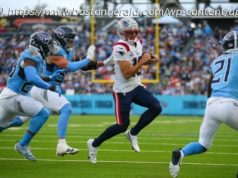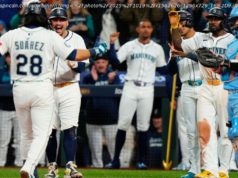Only the magic of the market can cure what ails college sports.
There is a famous story
1
about Sonny Vaccaro, the anti-NCAA crusader, that seems worth retelling.
As a Nike marketer in the 1970s, Vaccaro invented the practice of having Nike pay a college coach to have his players wear the company’s shoes. Those sneaker deals eventually morphed into deals with athletic departments worth tens of millions of dollars, which athletic-wear companies happily paid to have all of a school’s teams wear their gear.
QuickTake College Sports
In 2001, Vaccaro was invited to speak to the Knight Commission on Intercollegiate Athletics, a do-gooder organization devoted to reducing commercialism in college sports. Vaccaro, a pugnacious man then plying his trade for Adidas, had no patience for its pieties.
« We want to put our materials on the bodies of your athletes, » he told the commission members, « and the best way to do that is to buy your school. Or buy your coach. »
Bryce Jordan, the president emeritus of Penn State University, responded indignantly. « Why should a university be an advertising medium for your industry? » he huffed.
Vaccaro shot back:
On Wednesday, Mark Emmert, president of the National College Athletic Association, announced the formation of a committee to be led by former Secretary of State and Stanford University Provost Condoleezza Rice, that would make recommendations on how to clean up college sports. In response to the recent arrests of four college basketball coaches in a bribery scandal along with an Adidas marketing executive and five others, Emmert acknowledged that the NCAA « needs to make substantive changes in the way we operate. » He added, « This is not the time for half measures or incremental changes. »
The commission’s mandate includes looking into the role of apparel companies like Nike, Adidas and UnderArmour; examining agents, advisers and « nonscholastic basketball” (meaning Amateur Athletic Union travel teams and basketball camps for top high school players); and reexamining the NCAA’s relationship with the National Basketball Association, which prevents its teams from drafting athletes until they turn 19.
It’s easy to understand why these areas would be Emmert’s focus. The NBA’s age limit, for example, has given rise to the phenomenon of basketball players who leave college after their freshman years and in so doing destroy the NCAA’s precious illusion that college athletes are students who just happen to be good at sports. As for those shoe companies, AAU coaches and unscrupulous agents, they drive much of the underground economy in college sports. One of the NCAA’s perennial goals has been to wipe out that underground economy, which it views as a desecration of its beloved « amateurism. »
What’s missing from Emmert’s agenda is the one substantive change that could truly end the underground economy: paying the players. Indeed, in an interview, the NCAA head made it plain that the commission would not be going down that road. « There’s really not any interest among university leaders to convert student-athletes into employees, » he told The Athletic, a new sports website.
And yet any fix the commissions recommends that doesn’t accommodate the free market will ultimately be exactly the kind of « half-measure » and « incremental change » that Emmert says he doesn’t want. Plus, it won’t work.
The crux of the issue is that college sports is a big business. Daniel Rascher, a sports economist at the University of San Francisco, has estimated that college sports generates $13 billion a year. That’s the same amount the National Football League took in last year.
You could argue that it’s always been a business, and that’s true, but 30 or 40 years ago it was more cottage industry than Fortune 500 company. Television revenue was a pittance and coaches didn’t earn more than the college president.
You could also argue that there’s always been an underground economy, and that’s true, too. But it hadn’t become systematized the way it is now—mostly it was wealthy team boosters giving players cash or use of a car. Now the stakes are much higher. Coaches need good players so they can hold onto their $3 million paychecks. Shoe companies need good players to go to “their” universities. Agents need to land good players to earn commissions on the contracts they negotiate once the player turns pro.
Those pressures are not going to ease just because the Federal Bureau of Investigation is sniffing around. And you can hardly expect the good players to ignore what’s going on.
Historically, the NCAA has tried to stamp out the underground economy by instituting rule after rule—400 pages worth—dictating what players can and can’t do. They can’t so much as talk to an agent, much less hire one, without losing their eligibility. They can’t have dinner at someone’s house more than a few times a year. They can’t accept royalties for a book. Until a few years ago, they couldn’t even take food from the dining table back to their room. And of course, they can’t take money from anyone besides their parents.
But when you look at the mandate Emmert has given the commission, it’s hard to envision how yet more rules can solve any of these problems. Much of what the NCAA is trying to stamp out—shoe companies giving money to a high school athlete to steer him to a particular college, for instance—is already against the rules. Tightening the rules won’t work—the only thing that will work is loosening them. And to do that, the NCAA has to give up the notion that amateurism is the sine qua non of college sports.
College athletes should be able to hire agents while they are in school, and the NCAA could play a useful role by certifying them, just as the professional sports unions do. Athletes should be able to accept endorsements, which would instantly solve the shoe-company issue.
Most of all, athletes should be able to realize their fair market value while they’re in school, just like anyone else. With all the money pouring into college sports, the athletes know how valuable they are, and what a raw deal they’re getting. So long as the NCAA deprives them of the ability to make money on their labors, they will seek it somewhere else. That’s what happens when you try to suppress the market.






